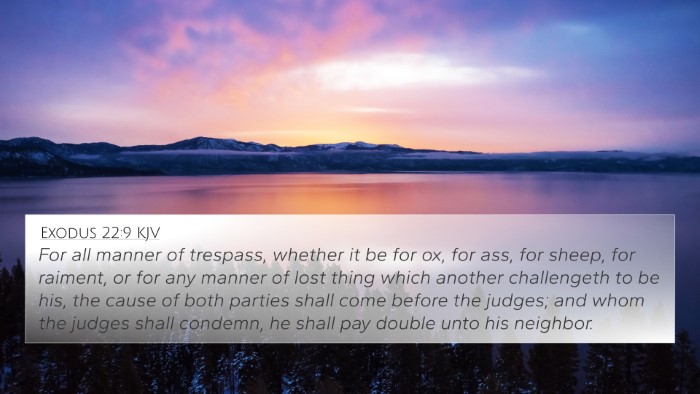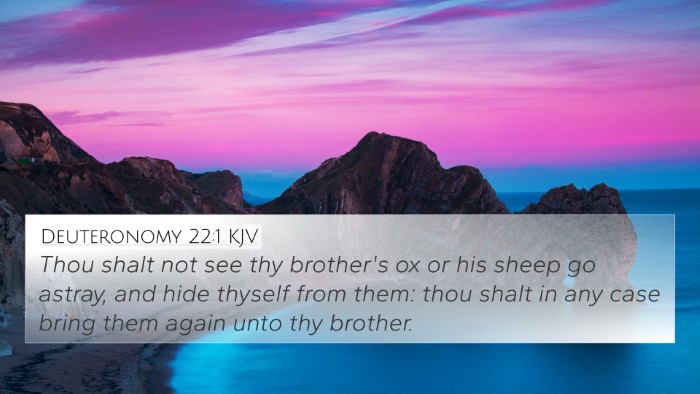Meaning and Interpretation of Leviticus 6:3
Leviticus 6:3 states:
"Or has found what was lost and lied about it, swearing falsely in any of these things that a man may do."
This verse is part of the larger context concerning the laws given to the Israelites, particularly dealing with sacrificial offerings for sin and wrongful acts. Here, the law addresses the concept of restitution and the seriousness of wrongdoings, specifically in the context of dishonesty.
Summary of Insights from Public Domain Commentaries
Matthew Henry's Commentary
Matthew Henry emphasizes the moral implications of dishonesty and emphasizes the need for truth. He notes that the law was designed to promote justice within the community, reflecting God's desire for His people to live righteously. He explains that restitution for wrongs is crucial, as it not only mends relationships but also maintains social order.
Albert Barnes' Notes
Barnes sheds light on the seriousness of the offenses related to a person’s dishonesty about lost items. He elaborates on the need for truthfulness and the observance of God’s commands, particularly in maintaining fairness and transparency in communal interactions. Barnes emphasizes that the verse serves as a warning against engaging in deceitful practices that could lead to mischief and disarray in society.
Adam Clarke's Commentary
Adam Clarke provides an in-depth exploration of the legal framework within which these offenses fall. He discusses the implications of swearing falsely and highlights the need for atonement for such sins. Clarke also points out that the system of sacrificial offerings provided a means for individuals to make things right with both God and their peers, thus restoring moral integrity.
Connections to Other Bible Verses
Leviticus 6:3 drives home the theme of integrity and accountability within a community. Here are several related verses that echo similar themes:
- Exodus 20:16: "You shall not bear false witness against your neighbor." This commandment explicitly prohibits dishonesty towards others.
- Numbers 5:6-7: Discusses restitution in cases of sin against a neighbor, encouraging the need for honest conduct.
- Proverbs 12:22: "Lying lips are an abomination to the Lord, but those who deal faithfully are His delight." This highlights God's disdain for dishonesty.
- Ephesians 4:25: "Therefore, putting away lying, let each one of you speak truth with his neighbor..." reinforcing the New Testament’s call for truth.
- Matthew 5:23-24: Jesus emphasizes the importance of reconciliation before presenting gifts at the altar, aligning with the tune of restitution.
- Zechariah 8:16: "These are the things you shall do: Speak each man the truth to his neighbor..." reinforcing community integrity.
- 1 John 1:8-10: Discussing the importance of confessing sins, which aligns with the theme of restoring integrity.
Thematic Bible Verse Connections
The essence of Leviticus 6:3 connects well to broader themes in Scripture regarding honesty, accountability, and the restoration of relationships. The need for truthfulness underlines numerous biblical tenets, as both the Old and New Testaments place a premium on integrity in relationships with God and each other.
Using Cross-References for Deeper Understanding
In order to gain a more profound understanding of Leviticus 6:3, one can utilize tools for Bible cross-referencing. This practice not only helps draw connections between different Scriptures but also enhances one's theological insight into the prudence invoked by God’s laws. Here are some methods for effective Bible cross-referencing:
- Utilize a Bible concordance to identify key themes and their corresponding verses.
- Engage with a Bible cross-reference guide to find immediate connections between similar scriptures.
- Practice cross-reference Bible study by researching passages that relate to themes of integrity and honesty.
- Explore comprehensive Bible cross-reference materials to identify deeper inter-Biblical dialogue and understanding.
Conclusion
In summary, Leviticus 6:3 serves not only as a guideline for restitution but also as a timeless reminder of the spiritual and moral importance of truthfulness in our interactions with one another. The surrounding verses and commentaries encapsulate a holistic view of God’s intent for His people—one that advocates for integrity, justice, and restoration. For those interested in further examining the connections between Bible verses, it is crucial to actively engage in cross-referencing, which enriches one’s study and application of biblical truths.











